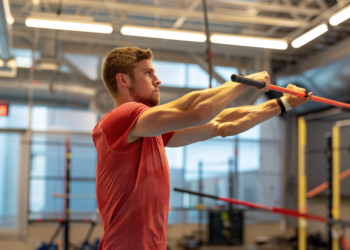Picture yourself as an athlete, a finely tuned machine striving for peak performance. Just as a well-oiled engine requires regular maintenance to function flawlessly, so too does your body. While you may have already explored various training methods, have you ever considered the benefits of incorporating yoga into your routine? As you continue on this journey of athletic excellence, let us explore the profound advantages that yoga can offer, from improved flexibility and range of motion to enhanced mental focus and reduced risk of injury. But there is more.
Key Takeaways
- Yoga improves physical performance by enhancing flexibility, range of motion, strength, and power in athletes.
- Yoga enhances balance and body awareness, leading to improved stability and agility.
- Yoga improves mental focus, concentration, and cognitive performance, helping athletes stay focused on their goals.
- Yoga reduces the risk of injury and promotes faster recovery times by increasing flexibility, building strength and stability, and reducing stress.
Improved Flexibility and Range of Motion
Yoga practice has been shown to significantly enhance athletes' flexibility and range of motion, allowing for improved performance and reduced risk of injury. Increased flexibility is a key component of overall athletic performance, as it enables athletes to move more freely and efficiently. By incorporating yoga into their training regimen, athletes can achieve greater joint mobility and muscle flexibility, which in turn leads to increased agility and improved performance.
Research studies have consistently demonstrated the positive effects of yoga on athletes' flexibility. A study published in the Journal of Strength and Conditioning Research found that yoga interventions led to significant improvements in hamstring and hip flexor flexibility among collegiate athletes. Another study published in the International Journal of Yoga Therapy showed that a 12-week yoga program improved range of motion in the shoulders and hips of professional basketball players.
The improved flexibility and range of motion gained through yoga practice directly translate into enhanced athletic performance. Athletes with increased flexibility are better equipped to perform dynamic movements, such as quick changes in direction and explosive jumps. This increased agility allows athletes to more effectively navigate through game situations and outperform their opponents.
Enhanced Balance and Body Awareness
Enhanced balance and body awareness are crucial components of athletic performance, and incorporating yoga into training regimens has been shown to improve these aspects for athletes. Yoga practices involve poses that challenge stability and require focused attention on body alignment, resulting in improved coordination and increased agility.
Research studies have demonstrated the positive effects of yoga on balance and body awareness in athletes. A study published in the Journal of Strength and Conditioning Research found that athletes who incorporated yoga into their training experienced significant improvements in balance compared to those who did not. Another study published in the International Journal of Sports Physical Therapy showed that yoga interventions enhanced body awareness in athletes, leading to improved proprioception and a better understanding of their body's position in space.
To further illustrate the benefits of yoga for balance and body awareness, consider the following table:
| Yoga Pose | Benefits |
|---|---|
| Tree Pose | Strengthens ankle stability and improves balance |
| Warrior III | Enhances overall body coordination and core stability |
| Eagle Pose | Increases agility and focus |
Increased Strength and Power
Incorporating yoga into training regimens has been shown to significantly increase strength and power in athletes. Numerous studies have demonstrated the positive impact of yoga on improved performance and enhanced athletic abilities.
Yoga poses, such as the plank, downward dog, and warrior poses, engage various muscle groups and challenge athletes to hold positions that require strength and stability. These poses target the core, upper body, lower body, and even smaller stabilizing muscles. By consistently practicing these poses, athletes can develop greater muscular strength, which is crucial for generating power in sports movements.
In addition to the physical demands, yoga also promotes mind-body connection and breath control. This aspect of yoga training helps athletes to optimize their movements and enhance their power output. By focusing on breath control and mindful movement, athletes can improve their overall coordination and timing, resulting in more powerful and efficient performance.
Moreover, yoga incorporates dynamic and static stretching, which increases flexibility and range of motion. With improved flexibility, athletes can generate greater force and power during explosive movements, such as jumping, sprinting, or throwing.
Enhanced Mental Focus and Concentration
Improved mental focus and concentration are key benefits that athletes can gain from integrating yoga into their training regimens. Yoga has been shown to have a positive impact on cognitive performance, increasing mindfulness, and reducing stress levels. By incorporating yoga into your routine, you can enhance your mental abilities and achieve better results in your athletic pursuits.
One of the reasons yoga enhances mental focus is through increased mindfulness. Mindfulness is the practice of being fully present and engaged in the current moment. By practicing yoga, you cultivate mindfulness, which can help you stay focused on your goals and perform at your best. Additionally, yoga incorporates deep breathing and relaxation techniques, which can reduce stress and anxiety, allowing you to concentrate more effectively.
A study published in the Journal of Physical Activity and Health found that yoga improved cognitive performance, including attention, memory, and processing speed. The researchers suggested that the combination of physical movement, breath control, and meditation in yoga contributes to these cognitive benefits.
Incorporating yoga into your training regimen can have significant benefits for your mental focus and concentration. By improving mindfulness and reducing stress, yoga can help you perform at your best and achieve your athletic goals. Consider adding yoga to your routine and experience the positive impact on your mental abilities.
| Benefits of Yoga for Athletes | |
|---|---|
| Improved Mental Focus and Concentration | :white_check_mark: |
| Increased Strength and Power | :white_check_mark: |
| Enhanced Flexibility and Range of Motion | :white_check_mark: |
Reduced Risk of Injury and Faster Recovery Times
One of the additional advantages of integrating yoga into your training regimen is the reduced risk of injury and faster recovery times. This is beneficial for athletes as it helps them improve their performance and endurance while minimizing the chances of getting injured. Additionally, yoga aids in the post-workout recovery process and reduces muscle soreness, allowing athletes to bounce back quicker and continue training at their optimal level.
Here are some key ways in which yoga contributes to reduced risk of injury and faster recovery times for athletes:
- Increased flexibility: Yoga helps improve flexibility, which is essential for athletes to perform their movements with a wider range of motion. This increased flexibility reduces the risk of strains and sprains during physical activity.
- Enhanced strength and stability: Yoga poses focus on building strength and stability in various muscle groups. This helps athletes develop a balanced body, reducing the likelihood of imbalances or weaknesses that could lead to injuries.
- Improved body awareness: Yoga emphasizes mindfulness and body awareness, enabling athletes to identify and address potential areas of weakness or tightness. By being more in tune with their bodies, athletes can make adjustments to avoid injury and promote faster recovery.
- Stress reduction: Yoga incorporates breathing techniques and relaxation exercises that help athletes manage stress and promote a faster recovery. Reduced stress levels contribute to better overall physical and mental well-being.
Frequently Asked Questions
Can Yoga Help Athletes Improve Their Endurance and Stamina?
Yes, yoga can help you improve your endurance and stamina. By improving flexibility and enhancing mental focus, yoga allows athletes to perform at their best for longer periods of time.
Is Yoga Suitable for All Types of Athletes, Regardless of Their Sport or Physical Condition?
Yoga is suitable for all athletes, regardless of sport or physical condition. It offers modifications tailored to individual needs and provides numerous benefits, such as injury prevention, improved flexibility, and enhanced mental focus.
How Often Should Athletes Incorporate Yoga Into Their Training Routine to See Optimal Results?
To see optimal results, athletes should incorporate yoga into their training routine at least 2-3 times per week. Consistency is key, as regular practice enhances flexibility, balance, and mental focus, improving overall performance and reducing the risk of injuries.
Can Yoga Be Used as a Form of Active Recovery for Athletes?
Yoga can serve as a form of active recovery for athletes. It has been shown to be as effective, if not more effective, than traditional active recovery methods. Additionally, yoga can help prevent sports-related injuries.
Are There Any Specific Yoga Poses or Sequences That Are Particularly Beneficial for Athletes?
There are specific yoga poses and sequences that can be particularly beneficial for athletes. These poses focus on muscle recovery and injury prevention. Incorporating them into your routine can help enhance your athletic performance.
Conclusion
In conclusion, it is clear that incorporating yoga into an athlete's training regimen can yield numerous benefits. The evidence supports the fact that yoga improves flexibility, balance, and strength, which ultimately enhances an athlete's performance. Additionally, yoga promotes mental focus and reduces the risk of injuries, allowing for faster recovery times. So, while some may dismiss yoga as a gentle practice, the irony lies in the undeniable scientific evidence that it is a powerful tool for athletes seeking to optimize their performance.













